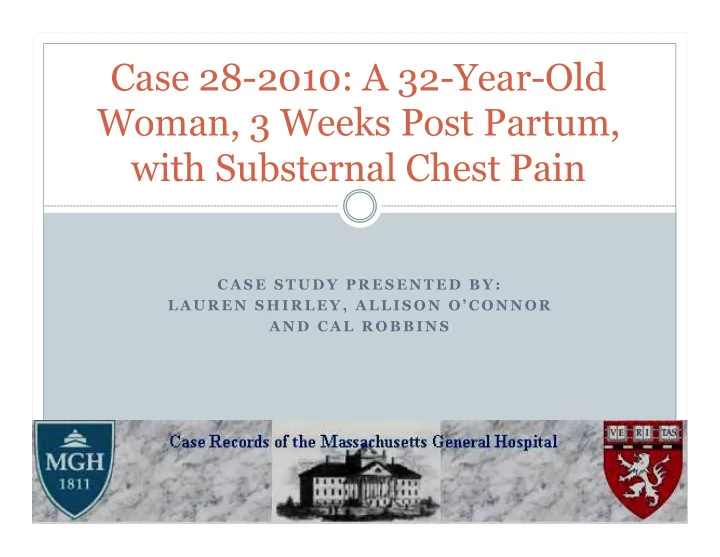

Case 28-2010: A 32-Year-Old Woman, 3 Weeks Post Partum, with Substernal Chest Pain C A S E S T U D Y P R E S E N T E D B Y : L A U R E N S H I R L E Y , A L L I S O N O ’ C O N N O R A N D C A L R O B B I N S
Medical History 3 weeks postpartum First pregnancy: hypertension and preeclampsia Normal blood pressure between pregnancies Second pregnancy: ¡ 1st trimester BP: 120-140/60-80 ¡ 2nd trimester BP: 118-120/60-82 ¡ 3rd trimester BP: 104-130/60-78 ¡ Postpartum BP: 120/80 ¡ Undersized placenta (340 grams) with increased perivillous fibrin No medications or allergies
Family and Social History Family History ¡ Parents: hypertension, hyperlipidemia ¡ Distant Cousin: stroke Social History ¡ Profession: physician ¡ Lives with husband, toddler, and newborn ¡ No use of alcohol, illicit drugs, or tobacco
Onset 7:25 PM ¡ Patient developed left jaw and substernal chest pain ¡ Pain resolved spontaneously 8:00 PM ¡ Chest pain returned ¡ EMS called, pain resolved after 20 min O 2 therapy
Onset (Continued) 8:26 PM ¡ Pain returned (7/10) with shortness of breath ¡ EMS returned ÷ BP: 148/74 mm Hg ÷ Pulse: 90-100 bpm ÷ Interventions: Oxygen, 325mg Aspirin, Nitroglycerin (x3), Morphine 4mg ¡ Pain resolved en route, arrived at ED 8:50P
Physical Exam Vital Signs ¡ Blood Pressure: 143/92 mm Hg on left, 137/81 mm Hg on right ¡ Heart Rate: 83-92 bpm ¡ Neck: jugular vein distension (JVP 6-7 cm H2O) ¡ Cardiovascular: no murmurs, rubs, or gallops
Labs ECG: ¡ Normal sinus rhythm ¡ Incomplete right Bundle Branch Block ¡ ST elevation in V2, V3 CK MB and Troponin I were negative Electrolytes were normal
Diagnostic Process Chief Complaint: Substernal Chest Pain, Radiating to Jaw Possible Causes of Chest Pain: ¡ Cardiovascular ¡ Pulmonary ¡ Gastrointestinal ¡ Musculoskeletal
Shows coronary artery dissection in the mid-to-distal left anterior descending artery (35mm long segment of narrowing, 90% stenosis)
Coronary Angiography-LAD Day 0
What is a coronary artery dissection? Tear in the coronary artery ¡ Inner and outer layer of the artery separate ¡ Blood pools in the area between the layers Tear can slow and/or block blood flow to the heart causing a heart attack, abnormalities in heart rhythm or sudden death Symptoms ¡ Chest Pain ¡ Rapid HR; fluttery feeling in chest ¡ Pain in arms, shoulder or jaw ¡ Shortness of breath ¡ Sweating ¡ Unusual tiredness ¡ Nausea ¡ Dizziness
Postpartum Coronary Artery Dissections 75% of postpartum SCAD occur 1 day to 3 months postpartum (most occur within first 2 weeks) Mean age 33 y/o 87% occur in left coronary tree
Idiopathic Spontaneous Coronary Artery Dissection 75% pt’s female, premenopausal with no traditional cardiac risk factors 80% occur in left coronary tree Precipitated by activities that cause coronary shear stress ¡ severe systolic hypertension ¡ cocaine use, snow shoveling ¡ weight lifting, etc. ¡ As well as seemingly benign stresses such as running, aerobics, sneezing, etc. Pt.’s chest pain began right after picking up toddler
Treatment There is no consensus on appropriate treatment Case dependent Usually a conservative approach is taken
Conservative Treatments Patients who are stable and pain free Cardiac Support ¡ Blood Thinners and Nitrates ¡ Intra-aortic Balloon Pump
Interventional Treatments Patients with major or continued ischemia ¡ Percutaneous Coronary Intervention (PCI) ¡ Coronary Artery Bypass Grafting (CABG)
Case Treatment Decisions Patient Information ¡ Left Anterior Descending Artery Dissection ¡ No Pain ¡ Slight Cardiac Ischemia
Case Treatment Decisions Conservative Medical Treatment ¡ Intra-aortic Balloon Pump ¡ β - blockers ¡ Antiplatelet Agents (Aspirin) ¡ Anticoagulation Agent (Heparin) Glycoprotein IIb/IIIa was not immediately administered
Resolution After 48hours ¡ Improved blood flow ¡ Dissection resolved ¡ Intra-aortic Pump Removed 2 Days
Resolution Discharged after 8 days with the following regimens: ¡ Warfarin, Atenolol, Simvastatin, Clopidogrel (discontinue after one year) ¡ Aspirin (indefinitely) 90 Days
Pathology 42-85% of cases involve Adventitial Inflammation due to Eosinophils Eosinophils release histolytic agents which cause dissections in coronary arteries
Cross Section of Ischemic Heart í
Questions? Case Study Citation: Sabatine, Marc S., Farouc A. Jaffer, Paul N. Statts, and James R. Stone. "Case 28-2010: A 32-Year-Old Woman, 3 Weeks Post Partum, with Substernal Chest Pain." The New England Journal of Medicine (2010): n. pag. Web.
Recommend
More recommend